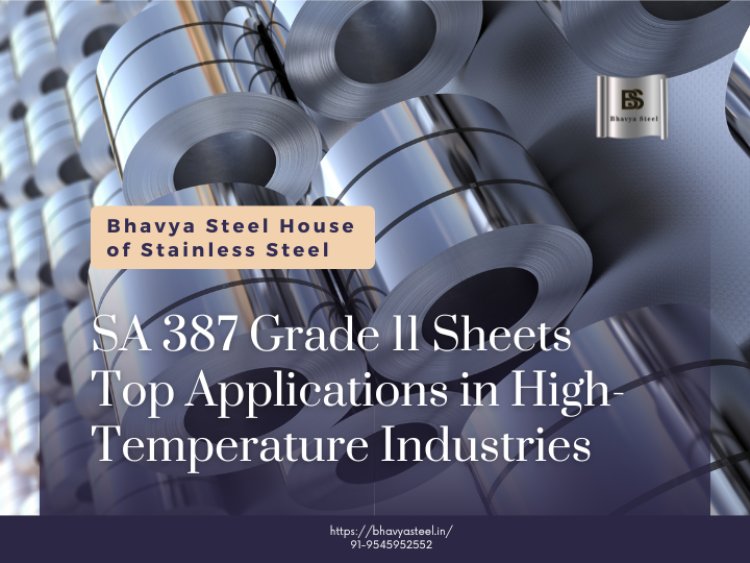SA 387 Grade 11 Sheets: Top Applications in High-Temperature Industries
Share this Post to earn Money ( Upto ₹100 per 1000 Views )

When it comes to industries that operate under extreme heat, material selection becomes critical to ensure safety, durability, and efficiency. Among the many materials available, SA 387 Grade 11 sheets are widely recognized for their exceptional performance in high-temperature environments. Composed of chromium, molybdenum, and other essential elements, SA 387 Grade 11 offers excellent heat resistance, corrosion resistance, and mechanical strength, making it a go-to choice for several demanding industrial applications.
In this blog, we will explore the top applications of SA 387 Grade 11 sheets in high-temperature industries, such as petrochemical plants, power generation facilities, oil refineries, and chemical processing plants.
1. SA 387 Grade 11 Sheets: An Overview
SA 387 Grade 11 is a pressure vessel quality steel alloy designed to handle high-temperature environments. Its composition typically includes chromium (Cr) and molybdenum (Mo), elements that contribute to its excellent heat resistance and ability to withstand corrosive conditions.
- Chromium improves oxidation resistance, which is essential when materials are exposed to high-temperature gases.
- Molybdenum enhances the strength and hardenability of the steel while improving its resistance to thermal stress.
These characteristics make SA 387 Grade 11 sheets ideal for industries where maintaining material integrity under high thermal loads is essential.
2. Applications in Petrochemical Industries
The petrochemical industry is one of the largest users of SA 387 Grade 11 sheets. Petrochemical plants often operate at high temperatures and pressures, requiring materials that can maintain their strength and structural integrity under such conditions.
Key applications include:
- Heat Exchangers: SA 387 Grade 11 sheets are commonly used to manufacture heat exchangers, which are critical for transferring heat between two fluids without mixing them. The material's high heat resistance ensures the safe operation of heat exchangers at elevated temperatures.
- Pressure Vessels: Pressure vessels in petrochemical plants must withstand extreme pressure and high temperatures. SA 387 Grade 11's strength and thermal stability make it the perfect material for constructing these vessels.
- Boilers: In petrochemical plants, boilers generate steam for various processes. SA 387 Grade 11 sheets are used in constructing boiler components to ensure they withstand continuous high-temperature exposure.
Why SA 387 Grade 11?
Petrochemical processes often involve corrosive chemicals and high-temperature reactions. SA 387 Grade 11's composition ensures resistance to both thermal stress and corrosion, making it ideal for these challenging environments.
3. Power Generation Industry
Power plants, especially those using coal, gas, or nuclear energy, operate under extreme temperatures, making material performance a critical factor. SA 387 Grade 11 sheets are widely used in the construction of boilers, pressure vessels, and heat-resistant components within these plants.
Key applications include:
- Boilers and Boiler Tubes: In coal-fired and gas-fired power plants, SA 387 Grade 11 sheets are used in the manufacturing of boiler tubes and components that are exposed to high heat. These boilers operate at temperatures exceeding 400°C, and the alloy’s resistance to creep (slow deformation under constant stress) ensures long-term reliability.
- Steam Turbine Components: SA 387 Grade 11's high heat tolerance is essential in steam turbines, where the material is exposed to high-temperature steam. Its ability to maintain mechanical integrity under such conditions extends the life of these critical components.
Why SA 387 Grade 11?
The strength and heat resistance of SA 387 Grade 11 are indispensable for maintaining the operational efficiency of power plants. Its durability ensures fewer replacements, reducing downtime and maintenance costs.
4. Oil Refineries
Oil refineries involve high-temperature processes, particularly during the distillation of crude oil into its various fractions. Materials used in this industry must handle high thermal loads and corrosive environments. SA 387 Grade 11 sheets are extensively used in refinery operations for components that are directly exposed to these harsh conditions.
Key applications include:
- Distillation Columns: These columns separate crude oil into different fractions based on boiling points. SA 387 Grade 11 sheets are often used in constructing these columns, as they must operate at high temperatures and withstand the corrosive effects of crude oil and its by-products.
- Reactors: Oil refinery reactors deal with high-temperature chemical reactions, often involving corrosive substances. The heat resistance and anti-corrosion properties of SA 387 Grade 11 ensure the longevity of these reactors.
Why SA 387 Grade 11?
In oil refineries, the combination of heat and corrosive materials makes SA 387 Grade 11's high-temperature resistance and anti-corrosive properties vital for efficient and safe operations.
5. Chemical Processing Plants
Chemical processing plants often operate in environments where both high temperatures and corrosive chemicals are present. The versatility of SA 387 Grade 11 sheets allows them to be used in equipment where resistance to heat, pressure, and chemicals is essential.
Key applications include:
- Reactor Vessels: Chemical reactions in processing plants often occur at high temperatures and pressures. SA 387 Grade 11 sheets are used to construct reactor vessels that handle these conditions without degrading or losing their strength.
- Piping Systems: High-temperature fluids and corrosive chemicals often pass through piping systems in chemical plants. SA 387 Grade 11 sheets are used to manufacture pipes that can handle these extreme conditions.
Why SA 387 Grade 11?
The alloy’s ability to maintain its structural integrity under high-temperature and corrosive environments makes it a popular choice in chemical processing industries where reliability is critical.
6. Advantages of SA 387 Grade 11 Sheets in High-Temperature Applications
SA 387 Grade 11 sheets offer several advantages that make them essential in high-temperature industries:
- High tensile strength: The material’s strength ensures it can handle the mechanical stresses associated with high-temperature environments.
- Creep resistance: In industries like power generation, where components are exposed to heat for long periods, creep resistance is critical to prevent deformation.
- Corrosion resistance: SA 387 Grade 11’s chromium and molybdenum content protects against oxidation and corrosion, extending the life of equipment in harsh environments.
- Thermal conductivity: Its ability to conduct heat efficiently ensures that the material remains structurally sound even under continuous exposure to high temperatures.
Conclusion
SA 387 Grade 11 sheets are a top choice for industries that require materials capable of withstanding high temperatures and corrosive environments. Whether it's the petrochemical, power generation, oil refining, or chemical processing industry, SA 387 Grade 11's unique composition and properties make it invaluable in these demanding settings.
If your project involves extreme temperatures and requires a material that can handle both heat and corrosion, SA 387 Grade 11 sheets are the reliable solution. Contact us today to learn more about how SA 387 Grade 11 sheets can enhance the efficiency and safety of your high-temperature applications.
Bhavya Steel House of Stainless Steel















